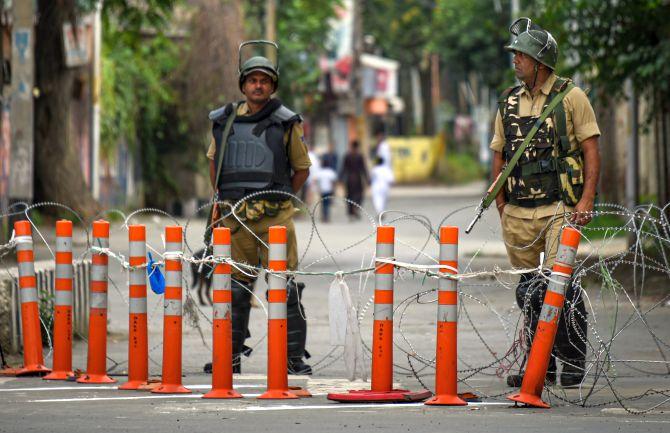'The heart of the matter is that India is not Israel,' points out Ambassador M K Bhadrakumar.

'I believe the security situation will improve (in J&K), it will allow the refugees to go back, and in your lifetime, you will be able to go back... and you will be able to find security, because we already have a model in the world.'
'I don't know why we don't follow it. It has happened in the Middle East. If the Israeli people can do it, we can also do it.'
The above reported remarks by India's consul general in New York Sandeep Chakravorty while addressing an audience of Kashmiri Pandits raised some dust in the Indian media.
But his job or career is in no mortal danger.
For, Chakravorty must be an intelligent man and probably estimated that he was only articulating from a Track 1.5 platform the Modi government's surreptitious policy in J&K --- following the Israeli footfalls of forcible occupation and colonisation of lands inhabited by alienated people.
Whether the policy is do-able or not is for time to tell.
To my mind, the final word is not yet available whether even the brutal Israeli policy will work or not.
Besides, the circumstances are vastly different, and Kashmir is not an analogous situation.
The main difference is that although the Indian State resorted to the use of force, much like Israel had done in Palestinian lands, the security situation has only deteriorated over the years, over decades.
There are no two opinions that even half a million troops could not achieve anything by way of enduring results in the Kashmir valley.
The ground realities in the valley militate against repression and State terrorism as a viable policy option for a country such as India.
The stark evidence of it lies in the government's decision in August to change the status of J&K which is an admission of failure rather than a mark of triumphant glory.
Consul General Chakravorty seems unaware how Israel went about systematically to prepare an external environment first by subduing the Arab countries that surrounded it and harboured sympathy and were willing to support the Palestinian cause.
Arguably, India too should begin with defeating and subduing Pakistan first. But, honestly, such an option is not available for India in our thermonuclear era, now or ever, the bravado of our ruling elite and their acolytes notwithstanding.
Then, there is the Western support for Israel, which helps it to get away with murder.
The underlying factors here are complex and deep rooted in history.
At its core, the Western countries are constantly forced into an attitude of atonement for their anti-semitism that has a long and loathsome history dating back centuries.
Remember the notorious Dreyfus affair in France -- leave alone the slaughter of Jews in the Holocaust, which makes Angela Merkel wobbly in the legs even today when she mentions Israel.
Israel plays the 'anti-semitic card' very effectively.
In actual practice, any criticism of Israeli State violations against Palestinians is instantly discredited as being 'anti-semitic'.
Today, US Congresswomen Ilhan Omar and Rashida Tlaib and British Labour Party leader Jeremy Corbyn are in the crosshairs of the Israeli lobby for this reason.
Corbyn's sin is that he has pledged to cut military trade with Israel and move to officially recognise a Palestinian State if elected to power.
The well-known commentator Finian Cunningham recently wrote: 'This conflation of valid criticism of the Israeli State with being "anti-Jew" is a cynical distortion which is wielded to give Israel impunity from international law. It plays on moral blackmail of critics by equating the historical persecution of Jews and in particular the Nazi holocaust with the sanctity of the modern Israeli State.'
Unfortunately, there is a notion even amongst educated Indians (including bureaucrats in the Indian Foreign Service) that linking up with Jewish organisations would enable India to piggy ride on the Israeli lobby in the US.
The false notion largely stems from sinister claims about the influence of 'Jewish money' -- and, it is not of recent origin.
Didn't Brajesh Mishra, the NSA under Atal Bihari Vajpayee, envisage a US-Israel-India condominium?
The heart of the matter is that India is not Israel.
Unlike Judaism, Hinduism is not an Abrahamic religion and it is not joined at the hips with the Christian world.
This is one thing.
Second, while large sections of Hindus too have suffered cruel persecution through centuries, it happened to be at the hands of their co-religionists.
Clearly, there is no reason for atonement on the part of the West.
Third, while Indian Americans are a prosperous community relatively, their clout on Wall Street is minimal.
Unlike the 'Jewish lobby'.
Simply put, following the Israeli footfall on the occupation and colonisation of the Palestinian homeland or the territories illegally annexed during wars will not take India very far in regard of the J&K situation.
The bottom line is that Western opinion on Kashmir is supportive of neither India nor Pakistan.
It always rooted for the 'Third Option' -- an independent and sovereign State of Kashmir.
The official US position, in particular, always made it a point to stress that any solution should take into account the 'wishes of the Kashmiri people'.
In the prevailing geopolitical situation in Asia, an independent Kashmir State will be a strategic asset for Washington.
Surely, any colonisation of the Kashmir valley by non-Kashmiris grates against US interests.
Israel, on the contrary, is itself a Western creation on the map of the Middle East and the US condones Israel's war crimes and aggressive State policies as a matter of regional strategy.
One would imagine that an Indian diplomat of the rank of ambassador would know that discretion is the better part of valour.
Yet, he voiced maverick opinions like a run-of-the mill rabble-rouser on the Hindutva platform, which he should be intelligent enough to grasp would only serve to confirm Pakistani allegations regarding the Modi government's intentions behind the change of status of J&K.
The politicisation of the Indian Foreign Service, which such sordid episodes highlight, won't serve any good.
Ambassador M K Bhadrakumar served the Indian Foreign Service officer for more than 29 years. He has served as India's ambassador to Turkey and Uzbekistan and has been a contributor to Rediff.com for well over a decade.









